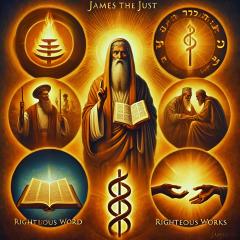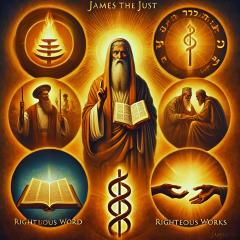Radio programme includes v17 (30min)
نامۀ یعقوب رسول
فصل دوم
تبعیض کردن گناه است
۱ ای عزیزان! به عنوان کسانی که به سَروَر پُر جلال ما عیسای مسیح ایمان دارید، هیچ تبعیضی در برابر مردم نداشته باشید. ۲ چنان که اگر شخصی با انگشتر طلا و لباس گرانبها به جمع شما بیاید و فقیری با لباس کهنه وارد شود ۳ و شما به کسی که لباس گرانبها دارد احترام بگذارید و به او بگویید: «بفرمایید، بالا بنشینید» و به شخص فقیر بگویید: «تو همین جا ایستاد باش یا در اینجا پیش پای من بنشین.» ۴ آیا با این کار تان در بین خود تبعیض قائل نمی شوید و آیا قضاوت شما از روی افکار پلید نیست؟
۵ ای عزیزان، گوش دهید! مگر خدا فقیران این دنیا را انتخاب نکرده است تا در ایمان خود دولتمند و وارث آن پادشاهی باشند که خدا به دوستداران خود وعده داده است؟ ۶ اما شما به فقیران بی احترامی می کنید. آیا ثروتمندان به شما ظلم نمی کنند و شما را به محکمه نمی کشند؟ ۷ آیا آنها به آن نام نیکو که خدا بر شما نهاده است، بی حرمتی نمی کنند؟
۸ اگر شما واقعاً شریعت شاهانۀ خداوند را که در کلامش گفته است: «همسایه ات را مانند خود دوست بدار» بجا آورید، کاری نیکویی انجام می دهید. ۹ ولی اگر مردم را به خاطر ظاهر شان احترام می کنید، مرتکب گناه می شوید و شریعت موسی شما را به عنوان گناهکار محکوم می کند. ۱۰ اگر کسی تمام شریعت را بجا آورد، ولی یکی از احکام آن را بشکند، او در برابر تمام شریعت مقصر است. ۱۱ زیرا همان کسی که گفت: «زنا نکن» همچنان گفته است: «قتل نکن.» پس اگر تو زنا نکنی ولی مرتکب قتل شوی، باز هم شریعت را شکسته ای. ۱۲ پس مانند کسانی سخن گویید و عمل نمایید که بر اساس شریعت آزادی بخش مورد قضاوت قرار خواهند گرفت. ۱۳ زیرا خدا بر آن کسی که به دیگران رحم نکرده است، رحیم نخواهد بود. رحمت همیشه بر داوری پیروز می گردد.
ایمان بدون عمل بی فایده است
۱۴ ای عزیزان! چه فایده دارد اگر کسی بگوید: «من ایمان دارم» ولی کاری به خاطر آن نمی کند؟ آیا تنها داشتن این گونه ایمان می تواند او را نجات دهد؟ ۱۵ برادر یا خواهری را تصور کنید که به لباس و غذای روزانۀ خود محتاج باشد، ۱۶ ولی اگر یکی از شما به او بگوید: «به سلامتی برو، گرم و سیر باش» و چیزی را که احتیاج دارد به او ندهد، فایدۀ گفتن این حرف چیست؟ ۱۷ همین طور ایمانی که با عمل همراه نباشد، مُرده است.
۱۸ ممکن است کسی بگوید: «تو ایمان داری و من اعمال نیک انجام می دهم.» حال تو برایم ایمانت را بدون اعمال نیک نشان بده و من ایمان خود را به وسیلۀ اعمال نیک خود به تو نشان می دهم. ۱۹ تو ایمان داری که خدا یکتا است، بسیار خوب. حتی ارواح شیطانی هم به این ایمان دارند و از ترس می لرزند. ۲۰ اما ای نادان! آیا نمی دانی که ایمان بدون اعمال نیک بی فایده است؟ ۲۱ آیا پدر ما ابراهیم به خاطر عمل نیک اش که پسر خود اسحاق را در قربانگاه تقدیم خدا کرد، عادل شمرده نشد؟ ۲۲ پس می بینی که ایمان و عمل با هم یکجا کار کردند، ایمان او با عملش تکمیل گردید. ۲۳ کلام خدا تحقق یافت که می گوید: «ابراهیم به خدا ایمان آورد و خدا این را برای او عدالت شمرد» و ابراهیم، دوست خدا خوانده شد. ۲۴ پس می بینید که یک انسان با عملش عادل شمرده شده است، نه فقط با ایمانش. ۲۵ همین طور آیا راحابِ فاحشه نیز با اعمال نیک خود عادل شمرده نشد، وقتی که به قاصدان اسرائیلی پناه داد و آنها را از راه دیگر روان کرد؟ ۲۶ همان طور که بدن بدون روح مُرده است، ایمان نیز بدون عمل مُرده است.






